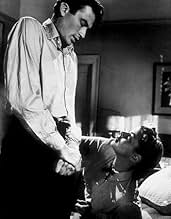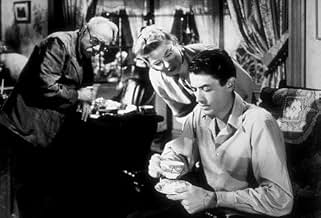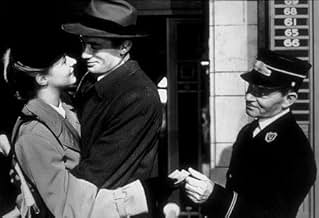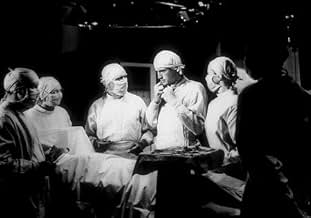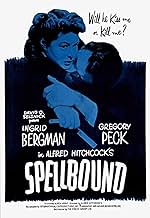Un (bel) homme se présente dans une clinique où lon attend le remplaçant du grand patron. Oui, il est bien le Dr Edwardes. Voire ? À table il a une réaction très étrange lorsque sa voisine t... Tout lireUn (bel) homme se présente dans une clinique où lon attend le remplaçant du grand patron. Oui, il est bien le Dr Edwardes. Voire ? À table il a une réaction très étrange lorsque sa voisine trace machinalement des sillons sur la nappe, avec sa fourchette. (en 255 caractères pour c... Tout lireUn (bel) homme se présente dans une clinique où lon attend le remplaçant du grand patron. Oui, il est bien le Dr Edwardes. Voire ? À table il a une réaction très étrange lorsque sa voisine trace machinalement des sillons sur la nappe, avec sa fourchette. (en 255 caractères pour champ texte)
- A remporté 1 oscar
- 8 victoires et 7 nominations au total
- Matron
- (uncredited)
- Railway Gateman
- (uncredited)
- Ticket Taker
- (uncredited)
- Gateman
- (uncredited)
Sommaire
Avis en vedette
An amnesia patient(Gregory Peck)is believed to be a psychotic killer. Bits and pieces of his memory about a childhood accident makes him believe that he is a murderer. Ingrid Bergman plays a young psychiatrist, who helps Peck unravel his past and regain his memory and mental health. During this process, the lovely doctor tries not to fall in love with her needy patient. She takes him to her old professor(Michael Chekhov) for help. He is reluctant to get involved with solving the mystery to clear the patient's name.
Brilliant camera work and being filmed in black & white really helped the story line. There is an eye opening dream sequence designed by Salvador Dali that is down right mystic.
The strong and talented cast also includes: Regis Toomey, Leo G. Carroll and Rhonda Fleming. This film is worth the time to watch again and again.
As things begin to unravel and the situation becomes public knowledge, Anthony does a runner and Constance leaves the asylum to track him down. The pair reunites and Constance quests to prove the innocence of her new lover.
This movie has suspense written all over it. I'm a big fan of Hitchcock movies, especially the cinematography. I love it when the shot cuts to a new location or landscape - almost in complete silence. It gives a certain eerie 'what's going to happen here?' feel to it. Even in the opening titles with the bare tree branches rattling in the wind - you know you're in for a real treat with that spooky music.
At times Peck's character does come across a bit of wimp during his funny 'spells' where he flashes back to a time when he THINKS he may have committed a crime. You want him to pull himself together and snap out of it, yet it's part of the plot so all is forgiven.
When all the signs point to guilt Constance, in what we can only assume is her own delusion and blindness, refuses to believe that Anthony could ever do something so heinous. Her scepticism rings true towards the end when her psychiatric training comes in handy and we discover what really happened. She calls on the expertise of her former mentor, played by Michael Chekhov, who plays the part of the probing, and rather peculiar, psychoanalyst well.
Bergman and Peck make a terrific pairing. The love their characters have for each other is so convincing, you pray (and hope) that Anthony is innocent and it's all a misunderstanding. Bergman portrays Constance's desperation so well - she is desperate to prove Anthony is a good man despite his multiple admissions of guilt.
What I had forgotten about was how almost impossibly silly all the psychoanalytical claptrap is, especially in the first couple of reels, which thereby make us feel very quickly that we're not quite in the mature, masterful grip of Hitch's usual wit and taste. Yes, I know this was made in the 40's, but the first 20 to 30 minutes of the film have more sexist moments and infantile behavior by supposed doctors than one would ever expect from either Hitch or Ben Hecht.
So who's to blame? One guess -- David O. Selznick! That being said (along with the fact that the story doesn't really add up to much of anything, since all the premises on which it's based seem so shaky, naive and downright goofy), the film has some things going for it. About midway through the picture, when Michael Chekhov appears as Dr. Brulov, the film suddenly kicks into what we might call "classic British Hitch mode," with the kind of understated wit and ensemble playing the director had been doing so well since the early 30's. It almost becomes another (and far more palatable) film at this point. The scenes with Bergman, Peck and Chekhov are the highlight of the film, and I have to admit that I'm even kind of fond of the hotel lobby scene, with the appealingly breezy Bill Goodwin (of "Burns and Allen" radio fame) as the house detective. Peck has never been more handsome, in a strangely fragile way.
Also worth a look are the brief but truly unusual Dali-designed dream sequences. There is something to be said for Miklos Rozsa's score as well: although it edges a bit far into soupy overscoring, the expressive main theme has quality, and his use of the theremin (which he also employed in his score for THE LOST WEEKEND at virtually the same time) is striking and represented "something new" in film music.
One could easily make excuses for this film based on "it was only 1945" or "what people knew about psychoanalysis was still naive", etc., but even taken in context of its time it's a pretty silly film without the kind of sustained surety of style leavened with simultaneous suspense, intelligence, taste and humor that he had already proved he could do so well from more than ten years earlier. Given a standard he had already given us with examples from THE 39 STEPS or YOUNG AND INNOCENT through THE LADY VANISHES in the UK, or FOREIGN CORRESPONDENT and SHADOW OF A DOUBT here in the US, this film seems not up to his true capacities, and like his other Selznick-produced American film, REBECCA, seems both overfussy and filled with emphases and spoonfeeding of details which Hitch himself would never have given us.
You need only compare this film with his very next one, NOTORIOUS, to be painfully aware how much better Hitchcock on his own -- using his own standards of pace, momentum and the ADULT treatment of script themes -- could be when not under the thumb of Selznick. Thank God he didn't have to work for him any more after this.
Le saviez-vous
- AnecdotesSir Alfred Hitchcock was disappointed with the limits of Gregory Peck's facial expressions. According to Peck, "I couldn't produce the facial expressions that Hitch wanted turned on. I didn't have that facility. He already had a preconception of what the expression ought to be on your face, he planned that as carefully as the camera angles. Hitchcock was an outside fellow, and I had the Stanislavski training from the Neighborhood Playhouse, which means you work from the inside."
- GaffesThe burn on J.B.'s hand is only visible when Petersen notices it. It disappears in every other scene where his hand is visible (like when he is sitting on the couch with Dr. Brulov).
- Citations
Dr. Alex Brulov: Women make the best psychoanalysts until they fall in love. After that they make the best patients.
- Générique farfeluOpening credits: THE FAULT . . . . . IS NOT IN OUR STARS, BUT IN OURSELVES . . . . . - SHAKESPEARE
Our story deals with psychoanalysis, the method by which modern science treats the emotional problems of the sane.
The analyst seeks only to induce the patient to talk about his hidden problems, to open the locked doors of his mind.
Once the complexes that have been disturbing the patient are uncovered and interpreted, the illness and confusion disappear.....and the devils of unreason are driven from the human soul.
- Autres versionsThe original theatrical version had an Overture and Exit Music by Miklós Rózsa, to a total running time of 118m09s. It was suppressed from distribution until the 1999 restoration based on the negatives of Selznick library (that came to be owned by Walt Disney Company via ABC-TV) and two DVD editions.
- ConnexionsEdited into The Clock (2010)
Meilleurs choix
- How long is Spellbound?Propulsé par Alexa
- What is 'Spellbound' about?
- Is "Spellbound" based on a book?
- What does the opening caption say?
Détails
- Date de sortie
- Pays d’origine
- Langue
- Aussi connu sous le nom de
- Cuéntame tu vida
- Lieux de tournage
- Penn Station, Manhattan, Ville de New York, New York, États-Unis(establishing shot of the first train station)
- sociétés de production
- Consultez plus de crédits d'entreprise sur IMDbPro
Box-office
- Budget
- 1 696 377 $ US (estimation)
- Brut – à l'échelle mondiale
- 19 288 $ US
- Durée1 heure 51 minutes
- Couleur
- Rapport de forme
- 1.37 : 1
Contribuer à cette page



